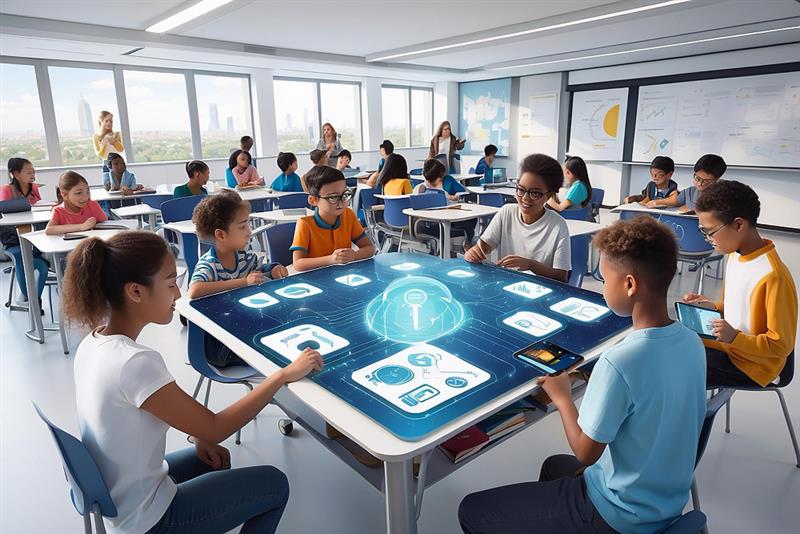Classrooms today are different from even five years ago. Digital tools are everywhere, from grading programs to learning platforms that personalise student exercises. Some teachers worry that technology could replace parts of their role. Others see ways to make lessons more engaging, personalised, and effective. The truth is somewhere in between. Technology can handle routine tasks, but it cannot replace the human guidance, mentorship, and insight that students need.
Because of these changes, advanced degrees are increasingly important. Programs such as the Master of Education (M.Ed.), English Language Learning (ELL) specialisations, and Doctor of Education (Ed.D.) equip educators with both knowledge and leadership skills. They help teachers stay relevant, manage classrooms, and shape learning in meaningful ways.
Changing Role of Educators
Digital tools are making some teaching tasks faster. Grading large volumes of assignments or tracking attendance can now be automated. Learning platforms provide practice exercises tailored to each student’s level.
While tools save time, they cannot replace the ability to design lessons that engage students, mentor them, and create a positive learning environment.
Why Advanced Degrees Are Essential
Some educators also wonder which skills technology cannot replace. The answer lies in human insight. It is important to understand a student’s needs, motivate them, and adapt lessons based on observation, which are skills no program can replicate. Advanced degrees help educators develop these skills and prepare for leadership roles in classrooms and beyond.
The Role of M.Ed. Programs
A Master of Education provides teachers with a deeper understanding of teaching strategies, learning theories, and instructional design. Beyond planning lessons, M.Ed. graduates learn to engage students critically, encourage collaboration, and support problem-solving.
Which degree best supports career growth? An M.Ed. is ideal for teachers who want to advance in classroom leadership, curriculum development, or instructional coaching. It helps educators integrate new tools into lessons while keeping teaching personal and meaningful.
The Importance of ELL Specialisations
Classrooms today are diverse, and English Language Learning programs help teachers meet these needs. ELL specialists learn strategies to support multilingual students while considering cultural backgrounds.
Some may ask whether translation apps reduce the need for ELL training. Tools can help with vocabulary, but teachers are essential for personalised feedback, explaining concepts clearly, and creating inclusive environments. Educators who combine technology with professional expertise are in high demand in schools worldwide.
The Value of Ed.D. Programs
A Doctor of Education prepares teachers for leadership, research, and policy roles. Ed.D. programs cover curriculum innovation, equity in schools, and strategies to improve student outcomes.
Ed.D. graduates focus on roles technology cannot replace: guiding schools, developing policies, designing systems, and leading teams. Their ability to make decisions based on research and student outcomes ensures they are highly valued in any education system.
Will Technology Replace Teachers?
This question often arises at education conferences. Some suggest technology could reduce the need for teachers in grading, tutoring, or preparing lessons. Others argue that human qualities such as empathy, motivation, and mentorship are irreplaceable.
Educators can stay relevant with advanced courses and professional development. Teachers with M.Ed., ELL, or Ed.D. qualifications are better able to integrate tools effectively and take on leadership roles in classrooms, schools, and districts.
Opportunities Technology Creates for Educators
While technology changes some tasks, it also creates new roles for educators with advanced qualifications. Examples include:
- Curriculum Designers who develop lessons integrating technology while addressing student needs.
- Learning Analysts who use data to track performance and improve outcomes.
- Instructional Leaders who guide schools through new learning methods.
- Global ELL Specialists who support diverse and multilingual classrooms.
So, how to combine technology with teaching without losing their professional role. You should learn to use these tools to enhance learning rather than replace human guidance. Teachers who can adapt in this way are in high demand globally.
If you have an advanced degree, it will help you move into leadership positions, managing curriculum, leading professional development, and implementing strategies that improve student engagement.
Practical Steps for Educators to Stay Relevant
Educators can take several steps to remain competitive:
- Pursue advanced degrees: Programs such as M.Ed., ELL, and Ed.D. provide the skills needed for classroom and leadership roles.
- Build a professional portfolio: Document lesson plans, classroom projects, and innovative strategies to show practical expertise.
- Engage in lifelong learning: Attend workshops, seminars, and professional courses to stay updated.
- Network with peers: Share ideas, exchange strategies, and learn from educators globally.
- Use technology thoughtfully: Integrate digital tools to enhance learning without replacing the teacher-student connection.
Do you need to learn every new app or tool? No. Understanding how technology supports instruction is more important than mastering every app or tool.
How Acacia Prepares Educators for a Changing World
Acacia University offers M.Ed., ELL, and Ed.D. programs designed to prepare educators for modern classrooms. Courses combine theory, practical experience, and leadership training.
Students learn to create engaging lessons, manage diverse classrooms, and lead schools effectively. The programs emphasise problem-solving, critical thinking, and instructional leadership, ensuring graduates are ready for global opportunities.
The curriculum aligns with global standards, helping graduates apply their skills in various educational systems. By completing these programs, educators gain confidence, practical expertise, and leadership skills that help them shape the future of learning worldwide.
Final Words
Teaching is changing, and so is the role of educators. Technology can help with some tasks, but it cannot replace the guidance, care, and experience teachers provide. Advanced degrees give teachers the skills and confidence to adapt, lead, and make a real difference in learning.
Programs like the M.Ed., ELL, and Ed.D. at Acacia University help teachers build practical skills and gain leadership experience. These programs prepare educators to not only keep up with changes but also to shape the future of education.
Take the next step in your teaching journey with Acacia University. Explore our M.Ed., ELL, and Ed.D. programs today and gain the skills, experience, and confidence to lead in classrooms and schools. Shape the future of education and make a lasting impact on students’ lives.









